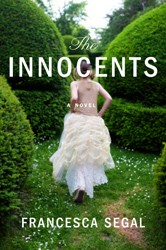On Monday, Francesca Segal wrote about recasting a classic novel. She will be blogging here all week for Jewish Book Council and MyJewishLearning.
 It’s amazing how many North Londoners have taken me aside in a furtive, conspiratorial kind of manner, in order to ask me for the truth. ‘Go on,’ a new acquaintance might urge, within moments of our meeting, ‘you can tell me. Who is it based on? Who are they really? I won’t tell anyone.’ Many people share the conviction that fiction must draw its cast members, if not its story lines, from the writer’s own life, and that conviction seems to be redoubled when the fiction in question takes place in a specific, familiar world. I grew up in Golders Green, a small Jewish suburb in North London, and my novel The Innocents is set nearby, in Hampstead Garden Suburb. Perhaps it was therefore inevitable.
It’s amazing how many North Londoners have taken me aside in a furtive, conspiratorial kind of manner, in order to ask me for the truth. ‘Go on,’ a new acquaintance might urge, within moments of our meeting, ‘you can tell me. Who is it based on? Who are they really? I won’t tell anyone.’ Many people share the conviction that fiction must draw its cast members, if not its story lines, from the writer’s own life, and that conviction seems to be redoubled when the fiction in question takes place in a specific, familiar world. I grew up in Golders Green, a small Jewish suburb in North London, and my novel The Innocents is set nearby, in Hampstead Garden Suburb. Perhaps it was therefore inevitable.
The truth, however, is less scandalous. My fiction is just that – fiction – as are my characters. I have lived in north-west London for almost my whole life, during which I have had more than three decades to make a fond, if sometimes exasperated study of its nuances, its climate, its residents. North London and I are old, old friends. And so Adam and Rachel are truly based on no one in particular, because each is based on a hundred people – just as they are formed, like any character in fiction, from who-knows-what preoccupations dredged from the murky bottom of my psyche. Rather than simply to create portraits of people one knows in real life, the fantastic joy and liberation of writing is to spend time in the company of the new people one has invented, and to discover what will happen to them.
Visit Francesca Segal’s official website here and join JBC on July 16th for a Twitter Book Club conversation with Francesca.
Francesca Segal is an award-winning British-American novelist, author of The Innocents, which won the Costa First Novel Award, the Sami Rohr Prize, the National Jewish Book Award for Fiction, and was long-listed for the Women’s Prize, amongst others; also The Awkward Age, and a critically-acclaimed memoir of prematurity, Mother Ship.



